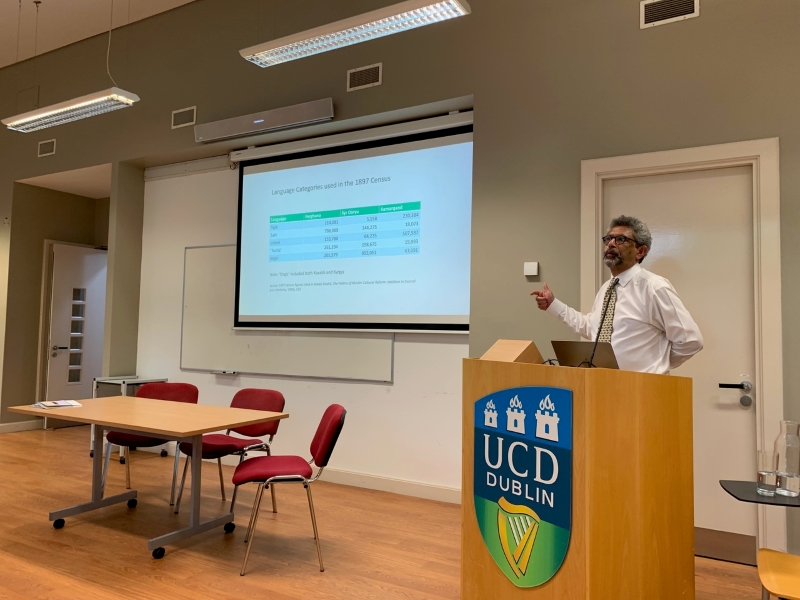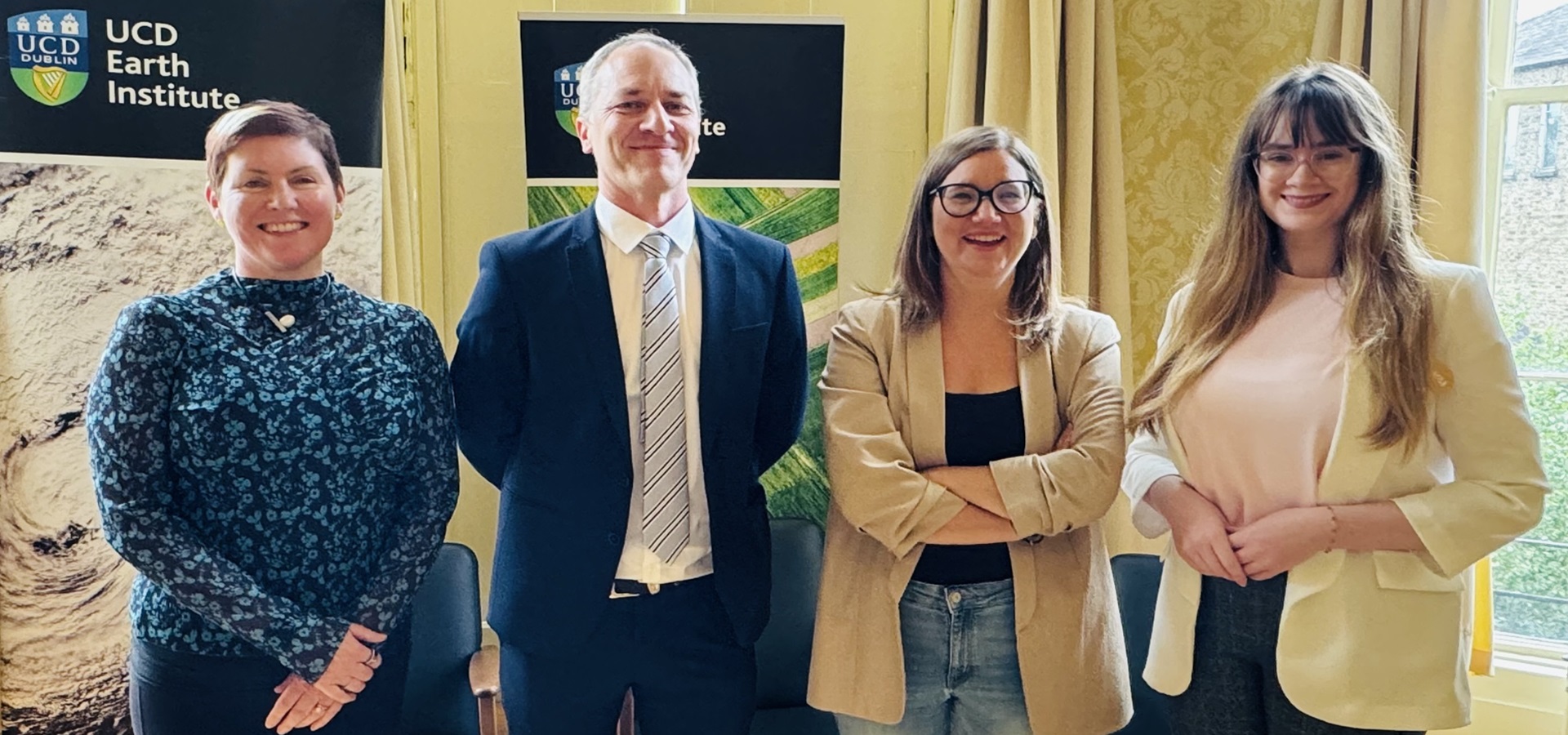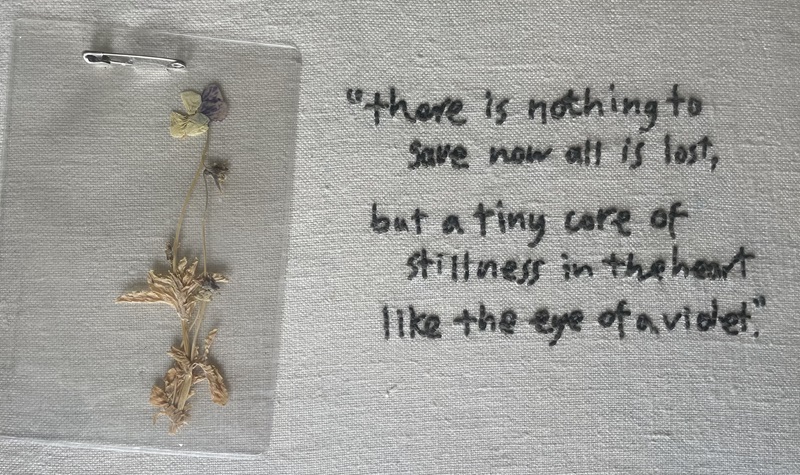Measuring Eurasia conference explores multidisciplinary and decolonial approaches to historical survey sciences
The Measuring Eurasia: Survey Sciences at the Edges of Empire international conference, hosted at the UCD Humanities Institute in late June 2024, thematically cohered around approaches to historical survey sciences generative of decolonial scholarship and politics such as cartography, census survey, ethnography. Decolonising the Russian Empire’s role in the shaping of modern Eurasia was a central feature of the keynote lecture by Dr Adeeb Khalid (Carleton College) on “Getting to know Central Asia: The production of imperial knowledge and its discontents”.

Dr Adeeb Khalid (Carleton College) delivering the Measuring Eurasia keynote paper, June 2024.
At its core, decolonisation is about the return of land to its legitimate inhabitants. In keeping with this, the Measuring Eurasia conference developed critical approaches to the imperial measure and survey of lands and peoples in the Baltics, Caucasia, Central Asia, and Siberia. One sweeping result across these disparate lands is the uncertainty and instability of colonial surveillance, as well as the generality of resistance to measurement by a variety of borderland communities. The conference organisers and participants believe these histories significant in questioning regimes of natural and social surveillance that not only persisted through the Soviet period in northern Eurasia, but in various related forms across European empires.
Scrutiny of techno-scientific programs to govern people and environments remains highly relevant in our own time amid new configurations of both Russian and Western imperialism, particularly as colonialist language persists in claims to dominate people and environments. These were key themes of our closing roundtable discussion, featuring Dr Khalid and Earth Institute member Dr Jennifer Keating (UCD School of History), which followed four fantastic sessions on “Frontier agents and encounters,” “Social survey sciences,” “Measurement and surveillance,” and “Re-thinking resources.”
Measuring Eurasia featured a range of diverse and leading scholars, including several early career researchers alongside eminent figures in the field. Importantly, too, contributors brought Inner Asian, Russian, Ukrainian, and Baltic perspectives, while also writing from academic fields including history, geoscience, political science, and science studies. Outputs include publication plans from diverse conference contributers and were organically developed in the course of discission over the two-day conference.
The conference was supported by the Irish Research Council, the UCD Humanities Institute, the UCD Earth Institute through our Small Responsive Scheme, UCD Environmental Humanities, and UCD College of Arts and Humanities. The Earth Institute Small Responsive Scheme was "vital for providing support to eight scholars who traveled from institutions in Europe and North America", said conference co-organiser Dr Patrick Anthony (UCD School of History).
The sessions and speakers are listed below and the conference programme is available here [pdf].
Session 1: Frontier agents and encounters. Chair: Patrick Anthony
Chechesh Kudachinova, “The German naturalists and a loophole between two empires: Order and disorder at inner Asia's frontier"
Christine Bischel, “On cold ground: Dmitrii L'vovich Ivanov and early glaciology in Russian Turkestan"
Session 2: Social survey sciences. Chair: Jennifer Keating
Katya Morgunova, "Behind the scenes of ethnographic expeditions in Northeast Siberia, c. 1890-1917"
Catherine Gibson, "Social Surveying in the late imperial Baltic provinces: Popular reactions to changing cultures of enumeration"
Session 3: Measurement and surveillance. Chair: Katja Bruisch
Kelly O'Neill, “Reconstructing Crimean waterscapes (and an empire's spatial culture) from survey projects"
Patrick Anthony, "Eurasian transits: the many paths of astro-navigation from the Black Sea to Lake Balkhash"
Simon Werrett, "Russian survey sciences: From the Great Embassy to the transit of Venus"
Keynote lecture
Adeeb Khalid, "Getting to know Central Asia: The production of imperial knowledge and its discontents"
Session 4: Rethinking Resources. Chair: Catherine Gibson
Oleksandr Polianichev, “The science of the exotic: South Caucasia and the idea of the Subtropics"
Vasily Borovoy, “Surveys and imperial modernisation: technocrats, governance, and natural resources in the European North of Russia, 1890s-1910s"
Katja Bruisch, "An inner periphery as far as the eye can see: Wetlands in the geographic imagination of the Russian Empire"
Closing Roundtable. Chair: Patrick Anthony
Jennifer Keating & Adeeb Khalid

